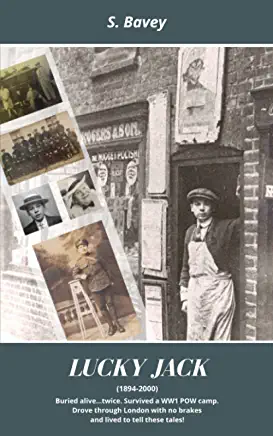Return of the Tuesday Book Review
With Burke and the Pimpernel Affair coming out on Friday, my blog is a bit occupied with the adventures of my Napoleonic spy at the moment. That should mean waiting a few weeks for my review of Lucky Jack. I don’t want to hang about, though, as Lucky Jack is a wonderful book and deserves all the support it can get. So I am yet again reviving my Tuesday book review slot so as to get the word out. I hope you enjoy it and that it encourages you to give the book a go.
Lucky Jack

This is a “sort of a memoir”. It sits between memoir (all in the first person, much in Jack’s own words) and a biography (put together by Jack’s granddaughter, Sue Bavey).
Jack was born in 1894 and died in 2000 age 106.
Jack was, in many ways, an ordinary man, so his experiences give a fascinating picture of the changes in life between the end of the 19th century and the very beginning of the 21st.
He describes incidents throughout his life in the same way, whether it was skating on the frozen Thames as a child or living the horror of the World War I trenches.
Jack was born the year before my father (yes, my father was very old and I am no longer young) and he was brought up not that far from where I live now, so I’m constantly catching glimpses of a world I heard described by my own dad or places that I know. Reading about the early 20th century like this is a strange experience. The familiarity of much of it suggests that life has not changed that much and then you come to a detail like his baby sister being buried in the same grave as a stranger “for a small cost” and you are reminded how much was different.
The 100th anniversary of the end of World War I three years back means that we know much more about the horrors of the trenches now than we did until recently but, even so, Jack’s account brought me closer to many of the realities of life in the trenches than anything else I’ve read.
Jack’s military service was not just in France. He also served in Dublin during the Easter Rising. He does not write much about this, but it is telling that he considered his posting back to Ypres was “a relief”. Our history books are too quiet on our relations with Ireland and this tantalisingly brief glimpse of the reality of British military occupation there is revealing.
Jack was captured by the Germans in March 1918 and gives a harrowing account of his life as a prisoner of war. For some reason (perhaps because we think that the old nationalist divisions should be left to heal) we hear little about the way in which the Germans treated their prisoners. I was quite shocked.
After the war, Jack returned to England and married. There are lots of glimpses of life with his new wife. These do not contribute much to our understanding of the period, but it is these vignettes of domestic life that make Jack a three dimensional human being. He takes on the role of Everyman, guiding us through the Depression and World War II.
The years after the Second World War are not covered in so much detail. He leaves London and, soon after, his wife dies. The rest of his life recounts the move from living with his son and daughter-in-law to lodging with an elderly friend, moving into sheltered accommodation and then counting down to death with a series of grand birthday parties: his hundredth, his 104th, his 105th, and finally one quieter party to mark his 106th birthday. He died three weeks later.
I read this because Sue Bavey asked me to and I was quite nervous of taking it on. Memoirs have become quite popular lately, but I wasn’t sure I wanted to read the life story of a West London cobbler. In fact, it was fascinating. Nowadays we say that children should learn about history from the experience of ordinary people, but what is usually presented as “ordinary people” is an anodyne composite of the man or woman in the street. These sanitised figures give no real understanding of the lives of “ordinary people” while Jack’s life, I felt, gave genuine insights into what the world was like throughout the 20th century: a period of astonishing change. As my father used to point out, he had grown up over a stables, when horses were the main form of transportation but he lived to fly abroad for his holidays and eventually to watch men travel to the moon. Jack shared these experiences. Like all children, I never paid proper attention to my father’s accounts of his life. Jack has given me another chance to understand it and I am grateful.
This is a wonderful book, which I recommend wholeheartedly. It is available on Amazon: https://www.amazon.co.uk/Lucky-Jack-1894-2000-Memoirs-World/dp/B09M544DST
